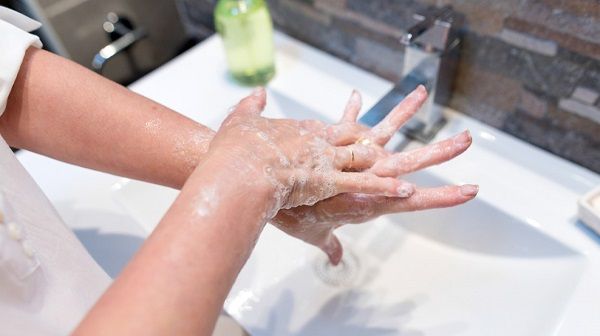Just In
- 41 min ago

- 2 hrs ago

- 10 hrs ago

- 10 hrs ago

Don't Miss
- Technology
 Google Pixel 9 Pro Live Images Leaked - Comes with Tensor G4, 16GB RAM
Google Pixel 9 Pro Live Images Leaked - Comes with Tensor G4, 16GB RAM - Sports
 DC vs SRH IPL 2024: Three Delhi Capitals players who will play against their ex-team Sunrisers Hyderabad
DC vs SRH IPL 2024: Three Delhi Capitals players who will play against their ex-team Sunrisers Hyderabad - News
 Elon Musk Postpones India Visit: New Dates Awaited For Tesla CEO's Trip
Elon Musk Postpones India Visit: New Dates Awaited For Tesla CEO's Trip - Movies
 Paarijatha Parvam Full Movie Leaked Online In HD For Free Download Hours After Its Theatrical Release
Paarijatha Parvam Full Movie Leaked Online In HD For Free Download Hours After Its Theatrical Release - Finance
 Daily Relative Strength Index RSI In A Bullish Mode of This Pharma Stock; Buy For TP Rs 635-685
Daily Relative Strength Index RSI In A Bullish Mode of This Pharma Stock; Buy For TP Rs 635-685 - Automobiles
 Mahindra XUV 3XO SUV – Everything We Know So Far
Mahindra XUV 3XO SUV – Everything We Know So Far - Education
 Exam Pressure Does Not Exist; Studying Punctually is Crucial; Says Aditi, the PSEB 2024 Topper
Exam Pressure Does Not Exist; Studying Punctually is Crucial; Says Aditi, the PSEB 2024 Topper - Travel
 Journey From Delhi To Ooty: Top Transport Options And Attractions
Journey From Delhi To Ooty: Top Transport Options And Attractions
Daily Habits That May Increase The Risk Of Common Cold
The common cold is not a serious condition, but it can interfere day-to-day activities of a person due to its symptoms such as coughing, sneezing, throat pain, headache and many others.

Many virus types are responsible for causing the common cold. Also, there are a number of conditions that induce a cold in people. They can be weather change, having uncooked foods, having foods at unhygienic places, physical contact with infected persons, pollution, flu etc.
In this article, we will discuss a number of factors which may increase the risk of getting the common cold.

1. Not maintaining hand hygiene
Maintaining proper hand hygiene is the foremost and basic rule for staying healthy. It decreases the multiplication of microorganisms and reduces infection risk. According to the CDC, hands should be properly cleaned with soap and water or alcohol-based hand sanitisers before eating, after using restrooms or anytime they look dirty.
This is because we touch our mouth and nose with hands several times a day, which may allow pathogens to enter directly into our body through these mucous membranes. [1]


2. Taking the elevators
Elevators might allow us to comfortably reach faster, but it has several disadvantages. Always using elevators can make you lazy and impact your physical health due to lack of movement.
Another reason is, the buttons of the elevators are touched by many infected hands. This may increase the risk of transfer of pathogens to your hands, and then to your body. Elevators also increase the chances of infection due to the enclosed space.


3. Lack of exercise
Exercises not only help maintain a proper waistline, but also improves our immunity and other body functions. It helps prevent the common cold up to a certain extent. [2]
Even performing simple exercises or walking can improve the function of white blood cells that help fight infections or other foreign substance entering the body. This may prevent us from getting sick.


4. Cold feet
Common folklore says that cold foot or chilling of the body surface can increase the risk of developing the common cold. This is because if the temperature of the feet decreases, the body temperature also starts decreasing, making the body susceptible to cold-causing pathogens. [3]
That is why it is advised to wear socks and keep the feet warm during the cold season.

5. Consuming alcohol/tobacco
Both, alcohol consumption and smoking tobacco are considered bad for our health. They are believed to suppress the immune system functions making them prone to many diseases and infections.
Smokers are more at the risk of getting cold due to their compromised respiratory system while alcohol consumption in excess is viewed as being immunosuppressive by the experts. [4]

6. Not getting proper sleep
Shorter sleep duration and poor sleep quality can cause a significant decrease in immunity and makes us prone to catching a common cold. They are also related to lower resistance to illness.
Lack of sleep leads to a reduction in natural killer cells and suppressed interleukin-2 production that helps regulate the activities of white blood cells. It is recommended to sleep for 7-8 hours a day. [5]

7. Stress
Several experimental trials say that psychological stress is directly linked to increased risk of developing infectious diseases, including the common cold. Stressful life events, daily problems and negative emotions can make a person vulnerable to the common cold due to the disruption in the functioning of the immune system. [6]
Avoid taking stress by practice meditation or other mind relaxation techniques. Also, seek emotional support, eat a balanced diet and exercise regularly.

8. Often visiting crowded places
Crowded places (malls or theatres) means more people and more people means more germs. In crowded places, we are likely to come in contact with many people and touch a lot of things which may allow the infections to directly come in contact with our body.
Therefore, it is better to avoid a crowded place if you often get sick or have a week immune system. Even if you visit, make sure to maintain proper hand hygiene and cover your mouth and nose.

9. Biting nails
Our fingers are twice dirtier than our hands. Nail-biting allows infections such as bacteria and pollen to directly enter our mouth and then our body. This increases the chances of catching a common cold easily.
Prevent biting nails and keep them short and clean.


10. Having unhealthy foods
Diet and immune system are interrelated. Having unhealthy foods such as saturated fats and sugary foods can weaken the immune system and lead to many inflammatory diseases, including the common cold.
Eat a well-balanced diet that consists of all vital nutrients. This helps boost the immune system which further helps protect the body from the attack of pathogens. [7]


11. Not drinking enough water
Water has a great influence on the immune system due to its important role in cellular functions. Staying hydrated keeps the body energised, immune system functioning and also helps clear out all the pathogens from the body that may cause the common cold. [8]
It is recommended to drink around 3 litres of water a day.
-
 wellness5 Foods To Relieve Common Cold Symptoms Like Sneezing And Runny Nose
wellness5 Foods To Relieve Common Cold Symptoms Like Sneezing And Runny Nose -
 nutritionHealth Benefits Of Garlic: From Common Cold To Cancer Treatment
nutritionHealth Benefits Of Garlic: From Common Cold To Cancer Treatment -
 healthCommon Cold T Cells May Offer Protection Against COVID-19: UK Study
healthCommon Cold T Cells May Offer Protection Against COVID-19: UK Study -
 disorders cureEverything You Need To Know About The Common Cold And Flu
disorders cureEverything You Need To Know About The Common Cold And Flu -
 wellnessBlackberries, Onions, Red Wine: Flavonoid-Rich Foods To Combat Flu And Common Cold
wellnessBlackberries, Onions, Red Wine: Flavonoid-Rich Foods To Combat Flu And Common Cold -
 wellnessCan Broccoli Help Fight Flu And Common Cold Symptoms?
wellnessCan Broccoli Help Fight Flu And Common Cold Symptoms? -
 wellnessAre Zinc Lozenges Effective For The Treatment Of Common Cold?
wellnessAre Zinc Lozenges Effective For The Treatment Of Common Cold? -
 wellnessCurd, Alcohol, Candies And Other Foods To Avoid When You Have Common Cold
wellnessCurd, Alcohol, Candies And Other Foods To Avoid When You Have Common Cold -
 disorders cureSigns That Say It’s More Than Just A Common Cold
disorders cureSigns That Say It’s More Than Just A Common Cold -
 wellness15 Foods That May Help Prevent The Common Cold
wellness15 Foods That May Help Prevent The Common Cold -
 disorders cure9 Surprising Facts About Common Cold You Never Knew!
disorders cure9 Surprising Facts About Common Cold You Never Knew! -
 disorders cure5 Indian Home Remedies For Cold That Actually Work!
disorders cure5 Indian Home Remedies For Cold That Actually Work!


 Click it and Unblock the Notifications
Click it and Unblock the Notifications








